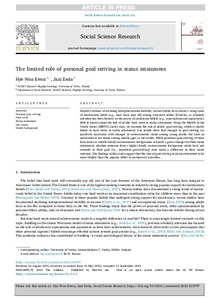The limited role of personal goal striving in status attainment, Social Science Research
Hye Won Kwon; Erola Jani
https://urn.fi/URN:NBN:fi-fe2022112967755
Tiivistelmä
Despite evidence of declining intergenerational mobility, recent studies have shown a rising trend of meritocratic belief (e.g., hard work pays off) among American adults. However, as scholarly attention has been focused on the power of adolescent beliefs (e.g., expectations and aspirations), little is known about the role of adults' hard work in status attainment. Using the Midlife in the United States (MIDUS) survey data, we examine the role of adults’ goal striving, which is closely linked to hard work, in status attainment. Our results show that changes in goal striving are positively associated with changes in socioeconomic status among young adults, but such an association is not found among middle-aged or old adults. While persistent goal-striving of those from lower or middle family socioeconomic backgrounds is hardly a game-changer for their status attainment, whether someone from a higher family socioeconomic background works hard and commits to their goal (i.e., persistent goal-striving) does make a difference in their status outcome. The findings of this study suggest that the role of goal striving in status attainment is far more limited than the popular belief in meritocracy describes.
Kokoelmat
- Rinnakkaistallenteet [27094]
